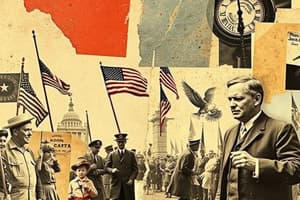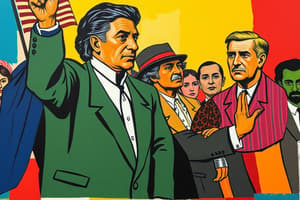Podcast
Questions and Answers
What was the Progressive Movement?
What was the Progressive Movement?
- A movement that sought to return control of the government to the people (correct)
- A movement promoting economic isolationism
- A movement focusing on international relations
- A movement against women's rights
What does prohibition mean?
What does prohibition mean?
the banning of the manufacture, sale and possession of alcoholic beverages.
What is a muckraker?
What is a muckraker?
A journalist who exposed the corrupt side of business and public life in the early 1900s.
What does suffrage refer to?
What does suffrage refer to?
What is an initiative?
What is an initiative?
What is a referendum?
What is a referendum?
What is the purpose of recall?
What is the purpose of recall?
What was the 17th Amendment?
What was the 17th Amendment?
What did the 19th Amendment achieve?
What did the 19th Amendment achieve?
What is scientific management?
What is scientific management?
Who was Susan B. Anthony?
Who was Susan B. Anthony?
What did the Meat Inspection Act establish?
What did the Meat Inspection Act establish?
What is the purpose of the Pure Food and Drug Act?
What is the purpose of the Pure Food and Drug Act?
What does conservation refer to?
What does conservation refer to?
Who is Upton Sinclair?
Who is Upton Sinclair?
Who was Theodore Roosevelt?
Who was Theodore Roosevelt?
What was the Square Deal?
What was the Square Deal?
What does NAACP stand for?
What does NAACP stand for?
What does NAWSA refer to?
What does NAWSA refer to?
Who was William Howard Taft?
Who was William Howard Taft?
What was the Payne-Aldrich Tariff?
What was the Payne-Aldrich Tariff?
What is a tariff?
What is a tariff?
Who is Woodrow Wilson?
Who is Woodrow Wilson?
What is the Bull-Moose Party?
What is the Bull-Moose Party?
What does the Federal Trade Commission (FTC) do?
What does the Federal Trade Commission (FTC) do?
What is The New Freedom?
What is The New Freedom?
What does the 16th Amendment allow?
What does the 16th Amendment allow?
What is the Federal Reserve System?
What is the Federal Reserve System?
What was the temperance movement?
What was the temperance movement?
What does mandate mean?
What does mandate mean?
Who was Carry Nation?
Who was Carry Nation?
What does WCTU stand for?
What does WCTU stand for?
Study Notes
Progressive Movement and Reforms
- Aimed to return government control to the people and address economic opportunities and injustices.
- Included significant legislative changes like direct election of senators and women's suffrage.
Prohibition
- Enforced a ban on the manufacture, sale, and possession of alcohol.
- Linked to the broader temperance movement focused on preventing alcohol consumption.
Muckrakers
- Journalists who exposed corruption and unethical practices in businesses and government during the early 1900s.
- Upton Sinclair's "The Jungle" highlighted deplorable conditions in the meatpacking industry, leading to significant reforms.
Women's Suffrage
- The right to vote, which was a critical issue addressed by organizations like NAWSA and figures such as Susan B. Anthony.
- The 19th Amendment, ratified in 1920, granted women the right to vote.
Legislative Measures and Direct Democracy
- Initiative: Allows voters to propose legislation directly.
- Referendum: Facilitates voting on proposed laws by the electorate.
- Recall: Enables voters to remove elected officials from office.
Key Amendments
- 17th Amendment: Enabled direct election of U.S. senators, enhancing democratic participation.
- 19th Amendment: Ensured women's voting rights, a significant milestone for gender equality.
- 16th Amendment: Authorized Congress to levy an income tax, altering federal revenue structures.
Key Figures and Organizations
- Theodore Roosevelt: President known for his Square Deal, focusing on social welfare and regulatory reforms.
- William Howard Taft: Roosevelt’s successor whose policies led to a rift in the Progressive Party.
- NAACP: Founded in 1909, dedicated to achieving racial equality.
- WCTU: Women's Christian Temperance Union, prominent in the prohibition movement.
Economic Reforms and Regulations
- Federal Trade Commission (FTC): Established in 1914 to address unfair business practices and promote consumer protection.
- Federal Reserve System: Created in 1913 to oversee the U.S. money supply and manage credit availability.
Social and Economic Ideologies
- Scientific Management: Applied to improve workplace efficiency through systematic studies.
- The New Freedom: Woodrow Wilson's platform focusing on economic reforms aimed at dismantling large power concentrations.
Tariffs and Trade
- Payne-Aldrich Tariff: Attempted tariff reform that fell short, contributing to Taft's unpopularity among progressives.
- Tariff: Levied taxes on imports to protect domestic industries from foreign competition.
Activism and Impact
- Carry Nation: Prohibitionist known for her militant tactics against saloons, symbolizing the fight for temperance.
- Conservation: Focused on sustainable management of natural resources for public benefit.
Studying That Suits You
Use AI to generate personalized quizzes and flashcards to suit your learning preferences.
Description
Test your knowledge on key concepts from Chapter 17 of US History. This set of flashcards covers significant terms like the Progressive Movement, prohibition, and muckrakers. Perfect for review and reinforcement of important historical concepts.




